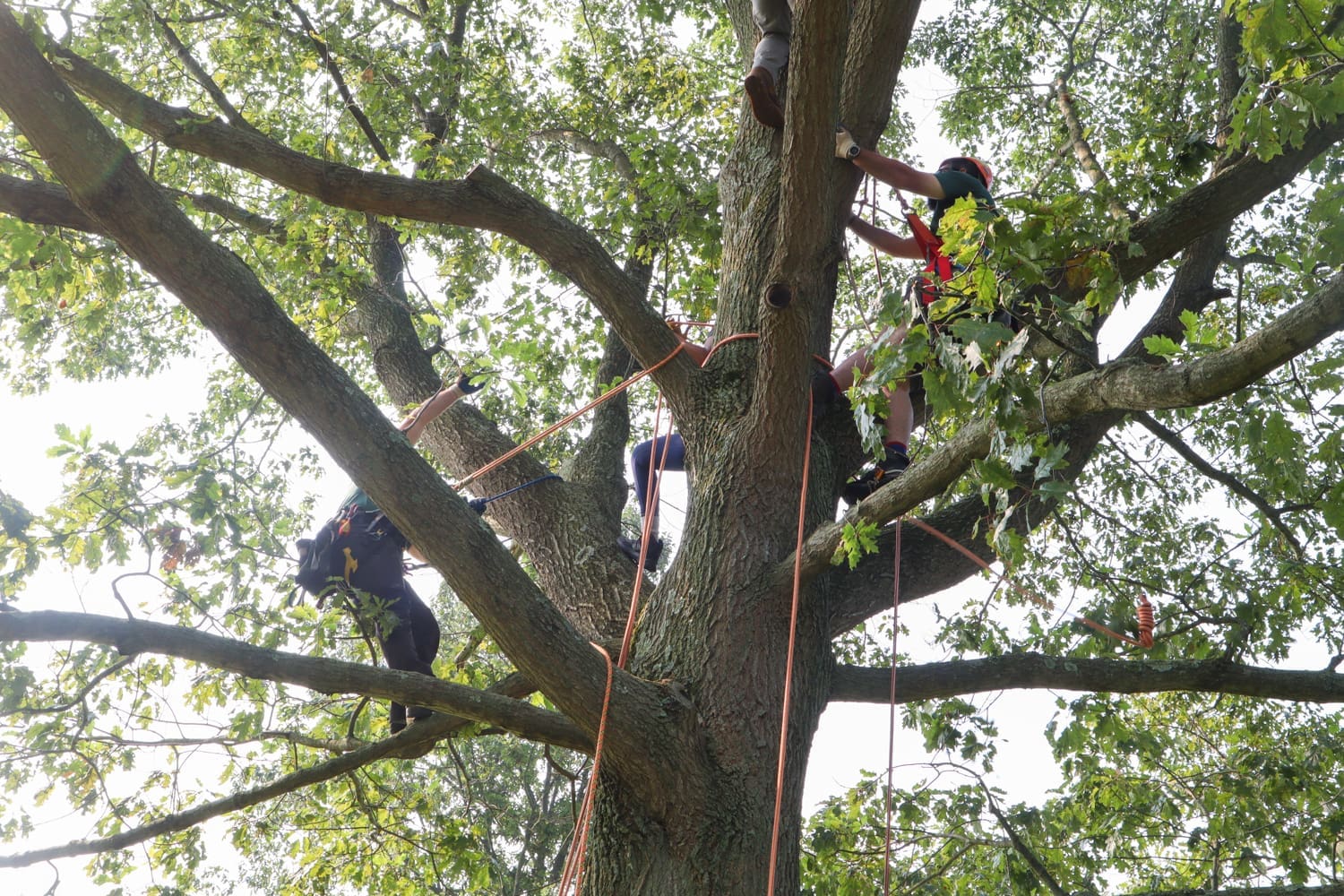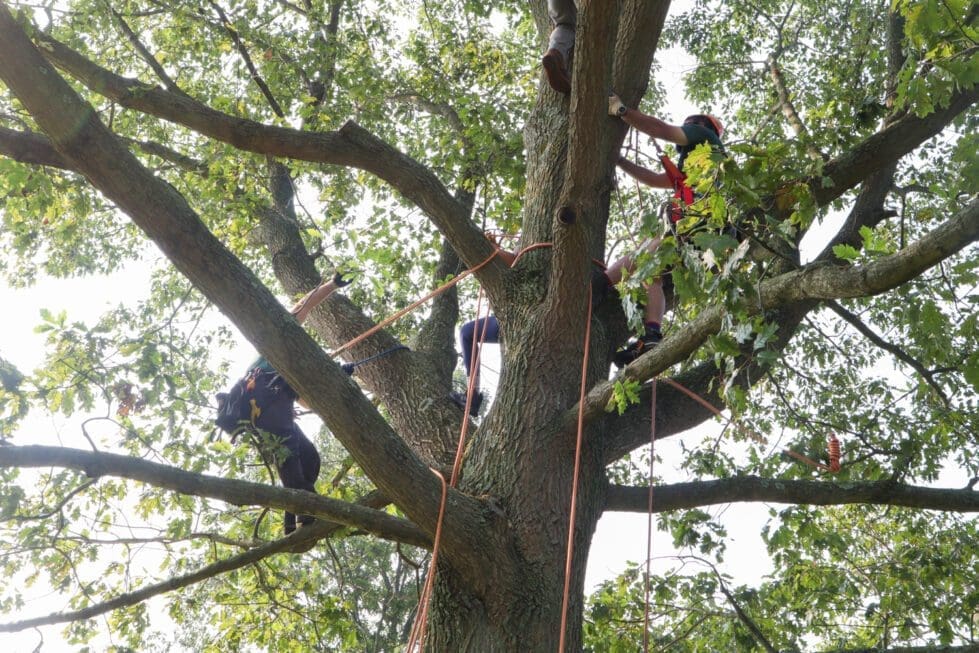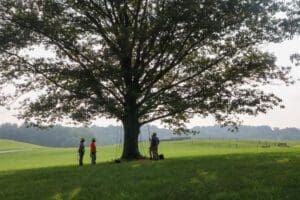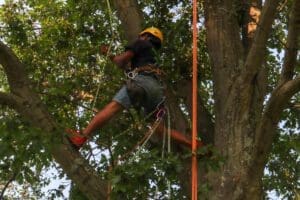

Delaware’s first ever tree-school is happening this week with plans to hold more throughout the state.
Winterthur is helping folks channel their adventurous side this week with the state’s first tree-climbing school.
In a culmination of mental fortitude meets physical endurance, the three-day event, ending Wednesday, will train 27 people to safely climb trees, while also teaching the basics of proper pruning techniques.
Pruning is a practice involving the selective removal of certain parts of a plant, such as branches, buds or roots.
The climbers are outside in the heat – and Canadian wildfire smoke – from 7:30 a.m. to 3:30 p.m.
“I think one challenge is just staying hydrated on a tree,” said Kadine Mohomed, a Bear resident who works as a materials scientist at W.L. Gore in Maryland. “We don’t usually take our water up with us, and hydration and making sure you get those electrolytes before being up there is important.”
The three-day course is a new cooperative program between University of Delaware Cooperative Extension, Penn State Extension and Winterthur Museum, Garden and Library.
“There’s climbing schools, but most of them are, ‘Here’s how you do it, now go home and do it.’ said James Savage, the lead instructor. “We show you how to climb, watch you and help you do it and show you what you’re doing wrong.”
Savage is an assistant professor of arboriculture at Penn State University. The class he teaches is for arborists, landscapers, new or inexperienced climbers and others who work in and around trees.
“It’s a unique educational experience for anybody who shows up,” he said. “It’s really different because we have people that have never climbed trees. They show up and we give them equipment. By tomorrow at noon, they should be going to the top of a 60- or 70-foot tree tree, working out the branches safely and able to get back to the ground.”
This is the sixth class Savage has taught this summer, and the first in Delaware.
He plans on teaching more in Delaware in the future, specifically in the south to attract participants from Maryland and Virginia.
“We had one in York [Pennsylvania] four weeks ago, and we actually had people from Illinois, Connecticut, New York, New Jersey,” he said. “I mean we have people from all over the country that fly in for the week to do this.”
A small group of participants in the inaugural school were from Washington, D.C.
“We have companies that send their new employees to teach them how to do it because it might be part of their job and it helps with production,” Savage said. “At the end, they’re going to know if they like climbing…. It takes skills that 99.99999% of the population do not want or care about, but it’s a very unique skill to know how to do.”
His passion for trees has taken him around the world, teaching classes and doing research in Switzerland, Italy, France, Germany, Mexico, Canada and more.
“It’s weird… I’ve made a life out of climbing trees,” he said. “I didn’t plan on it, but it happened.”
The course covers tree terminology, tree removal, safety and safe climbing practices, equipment and use of hand tools, tree disease and insect diagnosis as well as culture and pruning.
The knot used to tie themselves to a tree securely is called the Blake’s Hitch.
The class costs participants $300 for the class, or $100 a day, but they don’t have to pay for equipment, food or water.
“I spend a lot of time outdoors and I maintain a lot of the wetlands in my neighborhood, and that’s just something fun to do,” Mohomed said. “It helps me to disconnect from people and work and just relax.”
She rock climbs and power-lifts but had not climbed a tree before this week.
“It was advertised by the University of Delaware and when it came across my newsfeed I was excited to try because I get to be outdoors, I get to climb – which I love to rock climb – and I also get to use the strength I’ve developed from lifting for the past year.”
She said learning to properly prune is helpful to her family because she has children that play outside and she doesn’t want loose branches or wood falling on them or around the yard.
“If it’s windy, I don’t let them go out into the woods,” she said, “but if they’re playing, I’d like to at least bring down some of those dead branches, and this was a good starting point to knowing how to do that.”
It’s great to set goals that are difficult, but achievable, Mohomed said.
“Something that I’m feeling pretty proud of is when I show my kids pictures when I go home at the end of the day. They get excited,” she said. “It’s nice for my boys to see that as a woman in my 40s with teenage boys, I could accomplish things that they don’t typically see women doing.”


Raised in Doylestown, Pennsylvania, Jarek earned a B.A. in journalism and a B.A. in political science from Temple University in 2021. After running CNN’s Michael Smerconish’s YouTube channel, Jarek became a reporter for the Bucks County Herald before joining Delaware LIVE News.
Jarek can be reached by email at [email protected] or by phone at (215) 450-9982. Follow him on Twitter @jarekrutz
Share this Post







